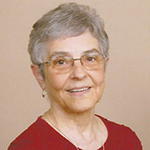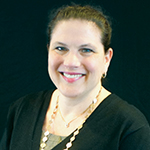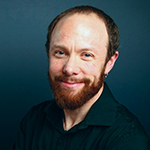During a CHA webinar on providing spiritual care to transgender people, a sister described one of the many harrowing phone calls she has received during her 24 years as a spiritual companion to people who are transitioning or have transitioned.
 Derouen
DerouenSr. Luisa Derouen, a Dominican Sister of Peace of St. Catharine, Kentucky, recalled the desperate middle-of-the-night call from Shane, who was both transgender and Catholic and struggling with feeling disconnected from the church. Sr. Derouen said
Shane, weeping, told her, "I miss going to Mass and I miss receiving Holy Communion. But I can't go back to church because I'm not safe there. The Catholic Church doesn't want me."
Transgender people are on a spiritual journey — a "holy journey," Sr. Derouen said, as they are "claiming the truth of who they are." She said it is important that the church and its ministries welcome them, show them dignity and compassion
and provide them with the spiritual care services they need.
Sr. Derouen was one of three main speakers during the June 8 webinar, "Care for the Transgender Soul: An Introduction to Spiritual Care for Trans Persons and their Families." The others were Erica Cohen Moore, executive director of the National Association
of Catholic Chaplains, and Jamez Terry, a chaplain with the Children's Hospital at Providence Alaska Medical Center in Anchorage. Webinar moderators were Jill Fisk, CHA director of mission services; and Fr. Charles Bouchard, OP, who retired in
late June as CHA senior director of theology and sponsorship.
 Moore
MooreDiscernment and action
During the webinar, Fisk and
Fr. Bouchard explained that CHA in recent years has been in discernment on how to advise the ministry when it comes to care of transgender patients.
Four years ago, CHA and the United States Conference of Catholic Bishops formed a task force on the subject. CHA produced a document on transgender people and the church. The conference's Committee on Doctrine has been using that document as well as other input to guide its work in this area. In March, the conference's committee issued a statement providing moral criteria to ministry
providers for "discerning which medical interventions promote the authentic good of the human person and which are in fact injurious," particularly when it comes to care of people with gender dysphoria or gender incongruence.
 Terry
TerryIn the statement, the committee said Catholic health care facilities are to "provide the best medical care, as well as Christ's compassionate accompaniment, to all patients, no matter who they may be or from what condition they may be suffering" but
that the means used "must respect the fundamental order of the human body" or else the human person will not be helped, but rather harmed.
CHA has formed a subcommittee that is working through the association's Spiritual Care Advisory Council to study how best to ensure that ministry facilities provide appropriate spiritual care services to transgender people. The three presenters of
the June webinar are on that subcommittee.
The subcommittee has been surveying some ministry facilities and convening groups of selected ministry leaders for discussion. Fisk said the subcommittee's main takeaway is that it is essential that the ministry provides all people who need spiritual
care with those services and the services should address the needs in a specific and holistic way. "We don't need to re-create our spiritual care services but to bring them forth" to all who need them, Fisk said.
Marginalization
Sr. Derouen said that based on her two-plus decades working closely with transgender people, it is her belief that being transgender is a medical condition, and not a personal choice, and since it
is a medical condition, it would be incorrect to refer to it as a pathology or as sinning against God. She said in today's heated political climate, incorrect narratives are promoted about transgender people such as that they are suffering from
a pathology and are at war with God. Sr. Derouen said some people pretend transgender people don't exist. She said denying the existence of transgender people contributes to their marginalization. That in turn causes stigma, shame, and secrecy.
She explained that people who are transgender generally move through several stages as they discover the gender they are meant to be. Those stages include false integration, disintegration and reintegration of a person's identity.
In describing the stages, she said the most fundamental spiritual question for everyone is "Who am I?" She said that question takes a lifetime to answer. Sr. Derouen described a common pattern for how many transgender people process that question.
First, they try to be who everyone expects them to be — false integration. Then they reach the point where they can't pretend to be who they aren't — disintegration. Then finally they claim to live in harmony with who they know
themselves to be — reintegration.
"It's a holy journey, as they become closer to who they are," Sr. Derouen said.
She added, "They deserve to be treated with dignity."
Pioneers
Terry, the children's hospital chaplain, became part of the transgender community two decades ago. Terry said it has been clear to him in the ensuing years that it is a common experience among people
in this community to have had a religious background and to have spiritual longings and to be undertaking "deep soul work as they discern who they are and who they are meant to be." Becoming aware of this, Terry said, "I discerned my own call"
to be a chaplain who helps people with their spiritual challenges.
Cohen Moore wrapped up the discussion by acknowledging that the church and its bishops are navigating numerous complex questions around the specifics of providing various types of care to transgender people. She said it is important for ministry
providers to stay abreast of that work and its implications.
While there is ambiguity and uncertainty in these matters now, Cohen Moore said ministry providers should proceed with love. "It's a journey, and we're pioneering in this area," she said. "In light of Catholic social teaching we are to live into
our set of competencies" — the competencies that have been established for chaplains.
She said, "Our competencies say we are to provide spiritual care that respects differences."